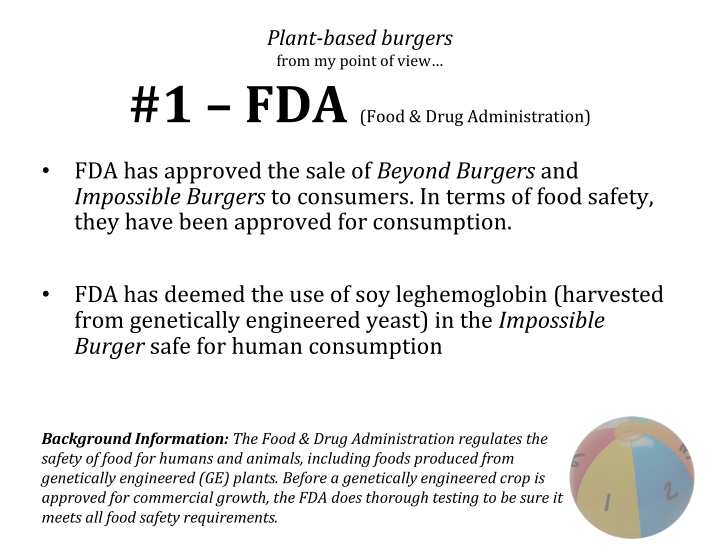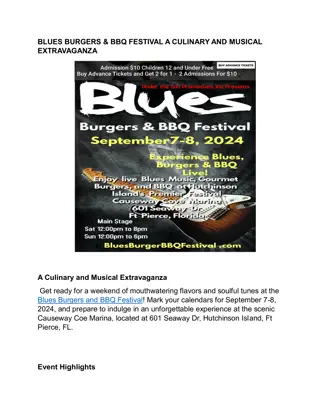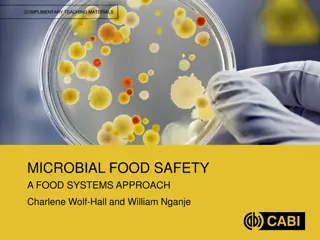Food Safety Approval for Beyond and Impossible Burgers
FDA has approved Beyond Burgers and Impossible Burgers for consumption, ensuring they meet food safety standards. Beef producers have varying opinions on plant-based alternatives, with concerns related to health, sustainability, and labeling. The debate extends to food marketers and nutritionists, reflecting consumer preferences and industry perspectives on plant-based options.
Uploaded on Feb 23, 2025 | 1 Views
Download Presentation

Please find below an Image/Link to download the presentation.
The content on the website is provided AS IS for your information and personal use only. It may not be sold, licensed, or shared on other websites without obtaining consent from the author.If you encounter any issues during the download, it is possible that the publisher has removed the file from their server.
You are allowed to download the files provided on this website for personal or commercial use, subject to the condition that they are used lawfully. All files are the property of their respective owners.
The content on the website is provided AS IS for your information and personal use only. It may not be sold, licensed, or shared on other websites without obtaining consent from the author.
E N D
Presentation Transcript
Plant-based burgers from my point of view #1 FDA (Food & Drug Administration) FDA has approved the sale of Beyond Burgers and Impossible Burgers to consumers. In terms of food safety, they have been approved for consumption. FDA has deemed the use of soy leghemoglobin (harvested from genetically engineered yeast) in the Impossible Burger safe for human consumption Background Information: The Food & Drug Administration regulates the safety of food for humans and animals, including foods produced from genetically engineered (GE) plants. Before a genetically engineered crop is approved for commercial growth, the FDA does thorough testing to be sure it meets all food safety requirements.
Plant-based burgers from my point of view #2 Beef Producer Some beef producers are indifferent to plant-based burgers and believe many consumers will continue to eat beef products Some beef producers are opposed to plant-based burgers because plant-based meats are advertised as superior alternatives to eating red meat o Example: Our belief is that the best way to get people to eat less meat is by giving them what they love in this case, a juicy delicious burger without so many of the health, sustainability, and animal welfare downsides of a traditional animal-based burger. Beyond Meat Background Information: Not all claims against beef production are accurate and in context. The United States beef has one of the lowest carbon footprints in the world. Greenhouse gas emissions from cattle account for two percent of U.S. greenhouse gas emissions.1 When it comes to health, recent studies claim the health benefits from eating less beef and pork are small.2 1.. https://caes.ucdavis.edu/news/articles/2016/04/livestock-and-climate-change-facts-and-fiction 2. https://www.nytimes.com/2019/09/30/health/red-meat-heart-cancer.html
Plant-based burgers from my point of view #3 Food Marketer Some consumers fear GMO foods and prefer to purchase foods labeled as non-GMO The Beyond Burger can be advertised as non-GMO while the Impossible Burger cannot Some consumers and beef producers believe plant-based burgers should not be marketed and advertised as beef or meat since they do not contain any beef or animal products Background Information: The dictionary definition of meat is the flesh of an animal (especially a mammal) as food. In 2018, the National Cattlemen s Association petitioned the United States Department of Agriculture (USDA) and Food Safety and Inspection Services (FSIS) to exclude products not derived directly from animals raised and slaughtered from the definition of beef and meat. 1 1. https://www.uscattlemen.org/Templates/pdfs_USCA/2018-PDFs/2-9-18USCA-AMS-Petition-re-definition-of- beef-and-meat.pdf
Plant-based burgers from my point of view #4 Nutritionist Plant-based burgers can provide an alternative protein source for consumers wishing not to consume animal products. As a nutritionist, I would say this: If you enjoy the taste of these faux meat burgers, and part of your food philosophy includes vegetarianism or eating to sustain the environment, then by all means, you should feel free to enjoy an Impossible Burger or Beyond Burger. But if you are choosing to eat these burgers solely for their health value, you may want to reconsider. Lisa Drayer, CNN Health Plant-based burgers and beef burgers are very comparable in terms of nutrition (fat and calories). Plant-based burgers have significantly more sodium. For example, the Impossible Burger has 240 calories, and 8 grams of saturated fat, thanks to coconut oil. By comparison, an 80% lean beef burger has 280 calories and 9 grams of saturated fat. That's not a whole lot of difference. Plant-based] meat burgers also rank higher in sodium than the beef and turkey burgers, with the Impossible Burger containing 370 milligrams of sodium, and the Beyond Burger containing 390 milligrams. The beef patty contains only 65 to 75 milligrams of sodium, depending on the brand. Lisa Drayer, CNN Health Sources 1. https://www.cnn.com/2019/08/09/health/plant-fake-meat-burgers-good-for-you-or-not/index.html
Plant-based burgers from my point of view #5 Consumer in Favor Some consumers are indifferent about plant-based burgers and beef burgers Some consumers are in favor of plant-based burgers because they contain no animal products or because they perceive an environmental benefit
Plant-based burgers from my point of view #6 Consumer Opposed Some consumers are opposed to plant-based burgers because they are highly processed Some consumers are opposed to the Impossible Burger because it contains ingredients harvested from genetically engineered yeast




![❤Book⚡[PDF]✔ Doing the Impossible: George E. Mueller and the Management of NASA’](/thumb/21684/book-pdf-doing-the-impossible-george-e-mueller-and-the-management-of-nasa.jpg)


















